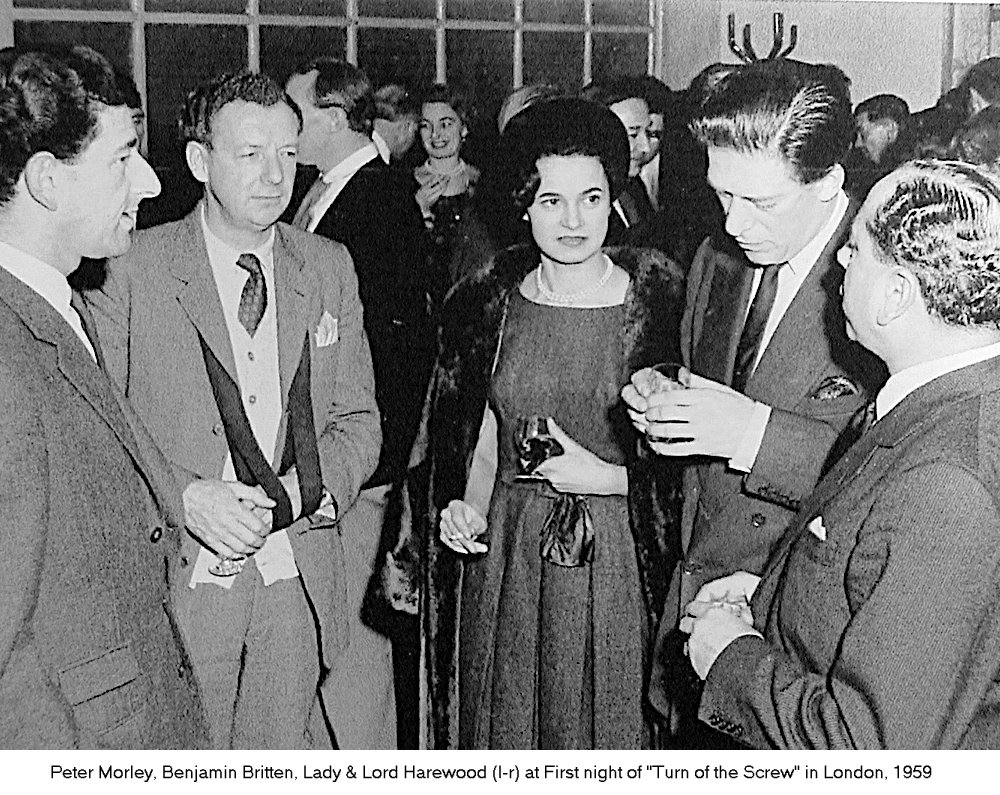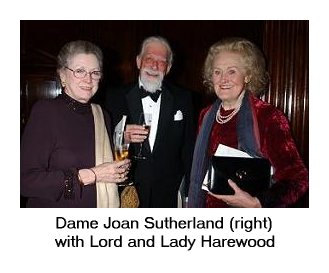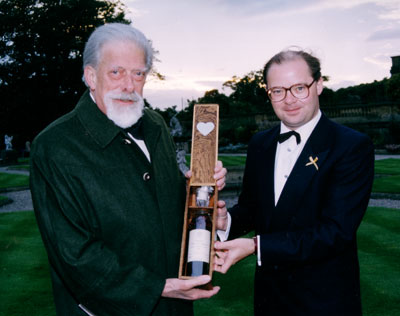The Earl of Harewood
By Bruce Duffie



 H: It depends on the person and
everyone is so different.
Some are fully-fledged at 21, and others come into their own in their
late 30’s. I suppose one bit of advice would be if you’ve got a
heavy kind of voice, don’t start doing big things too early, but that’s
very simple to give as advice. The temptations are so great, and
that’s the fault of the manager, of whom I have been, and indeed still
am one.
H: It depends on the person and
everyone is so different.
Some are fully-fledged at 21, and others come into their own in their
late 30’s. I suppose one bit of advice would be if you’ve got a
heavy kind of voice, don’t start doing big things too early, but that’s
very simple to give as advice. The temptations are so great, and
that’s the fault of the manager, of whom I have been, and indeed still
am one. H: There is a very good book
called The Grand Tradition
written
by J.B. Steane. If you remember, the thesis was that the
gramophone provided three convenient periods of about 25 years each –
roughly up to the end of the first war, then to the onset of LP’s
(about 1950), and the following 25 years –
not at all an inaccurate
division. Well, he said that the first period had wonderful
voices and beautifully expressive techniques, the middle period had
expressive people but rotten techniques and a lot of rotten singing
(there were exceptions of course), and the recent period had a rise in
the standard again. This had to do with audience expectation and
demands from conductors –
Toscanini, for instance, demanding a
“brutal” kind of expression that hadn’t been asked for earlier, and
that presumably he himself had not required.
H: There is a very good book
called The Grand Tradition
written
by J.B. Steane. If you remember, the thesis was that the
gramophone provided three convenient periods of about 25 years each –
roughly up to the end of the first war, then to the onset of LP’s
(about 1950), and the following 25 years –
not at all an inaccurate
division. Well, he said that the first period had wonderful
voices and beautifully expressive techniques, the middle period had
expressive people but rotten techniques and a lot of rotten singing
(there were exceptions of course), and the recent period had a rise in
the standard again. This had to do with audience expectation and
demands from conductors –
Toscanini, for instance, demanding a
“brutal” kind of expression that hadn’t been asked for earlier, and
that presumably he himself had not required. H: I don’t, and I would cite one
or two rather obvious items to
back that up. First, it was always meant by its early
practitioners – at least in the 19th century in
Italy, Germany, France – to be the thing that
the masses flocked to and that hit them solidly
in the midriff. It was an emotional, highly agreeable experience,
and that’s what the composers wrote for. They all wrote for
the box office – except for Wagner, and perhaps Beethoven. Before
that, it was an aristocratic art, but one would hardly say that
Mozart’s operas were exclusively elitist. It’s a lot like
Shakespeare. He wrote for people who were illiterate. They
couldn’t read or write, but that didn’t mean that they were
stupid. They were highly intelligent. He wrote to cause
enthusiasm, and that was certainly not elitist. I believe the
image of the opera being elitist is the kind of stuffed-shirt image of
men in white ties and funny-shaped hats, and ladies in
too-expensive dresses with a lot of jewelry on their head, but I don’t
think that’s at all an essential part of opera. There is
something else that one often forgets – it’s fairly rare that you put
on a Beethoven symphony for ten performances in three weeks; it’s very
rare that you don’t put on Bohème
for ten performances in three or four
weeks. It’s a tiny statistic, but nobody would call Beethoven an
elitist. Opera tickets are expensive and a lot people went for
the wrong reasons, and they dressed up too much, and in some way it was
made to be thought of as being for them and not for us.
H: I don’t, and I would cite one
or two rather obvious items to
back that up. First, it was always meant by its early
practitioners – at least in the 19th century in
Italy, Germany, France – to be the thing that
the masses flocked to and that hit them solidly
in the midriff. It was an emotional, highly agreeable experience,
and that’s what the composers wrote for. They all wrote for
the box office – except for Wagner, and perhaps Beethoven. Before
that, it was an aristocratic art, but one would hardly say that
Mozart’s operas were exclusively elitist. It’s a lot like
Shakespeare. He wrote for people who were illiterate. They
couldn’t read or write, but that didn’t mean that they were
stupid. They were highly intelligent. He wrote to cause
enthusiasm, and that was certainly not elitist. I believe the
image of the opera being elitist is the kind of stuffed-shirt image of
men in white ties and funny-shaped hats, and ladies in
too-expensive dresses with a lot of jewelry on their head, but I don’t
think that’s at all an essential part of opera. There is
something else that one often forgets – it’s fairly rare that you put
on a Beethoven symphony for ten performances in three weeks; it’s very
rare that you don’t put on Bohème
for ten performances in three or four
weeks. It’s a tiny statistic, but nobody would call Beethoven an
elitist. Opera tickets are expensive and a lot people went for
the wrong reasons, and they dressed up too much, and in some way it was
made to be thought of as being for them and not for us.
This interview was recorded on the telephone on May 6,
1987. The transcription was made in 1988 and published in The Opera Journal that March.
It
was slightly re-edited and posted on this
website in September, 2008.
To see a full list (with links) of interviews which have been transcribed and posted on this website, click here.
Award - winning broadcaster Bruce Duffie was with WNIB, Classical 97 in Chicago from 1975 until its final moment as a classical station in February of 2001. His interviews have also appeared in various magazines and journals since 1980, and he now continues his broadcast series on WNUR-FM, as well as on Contemporary Classical Internet Radio.
You are invited to visit his website for more information about his work, including selected transcripts of other interviews, plus a full list of his guests. He would also like to call your attention to the photos and information about his grandfather, who was a pioneer in the automotive field more than a century ago. You may also send him E-Mail with comments, questions and suggestions.